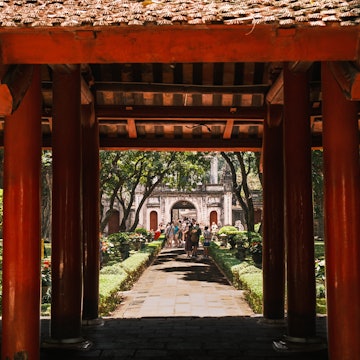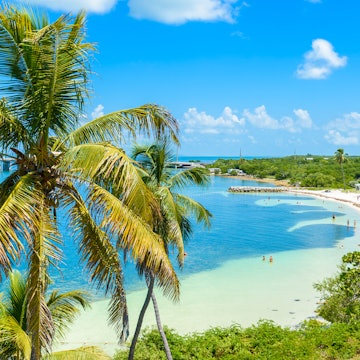
You can be a part of worldwide coral regeneration schemes – here's how
Mar 29, 2022 • 5 min read

Protecting these marine environments is crucial to the health of the oceans © Methanon / Shutterstock
Coral reefs are intricate ecosystems that quite literally breathe life into the world's oceans — but they are under threat.
Destruction of reefs – such as mass coral bleaching – is the result of a combination of factors including climate change and pollution. Scientists and communities are dedicated to protecting these marine environments, and in some destinations, travelers can help too by taking part in coral regeneration schemes.
5 hotels working to restore coral reefs around the world
What are coral regeneration schemes?
Coral regeneration schemes restore damaged and endangered reef ecosystems, such as the Baa Atoll in the Maldives. Scientists collect coral fragments from local reefs to be raised in nurseries until maturity, and later plant or restore them at reef sites. After decades of work by scientific and community-based coalitions around the world, these schemes have been proven as an effective method for restoring thriving reef systems.
Into the green: eight destinations for an eco-friendly escape
How does this help the sustainability of the oceans?
Coral reefs are lush underwater ecosystems, thought to be the home of around 25% of all marine life. These ecosystems provide homes, stability and sustainability to many marine flora and fauna species. Additionally, they protect coastal shorelines from storms and surges and help with water filtration in the oceans. This makes them an absolutely essential part of this planet. Coral restoration efforts work to protect these environments and nurse them back to health.
16 stunning eco-hotels for the environmentally conscious traveler

How to join coral restoration efforts around the world
Caring for coral reefs begins at an individual level, and knowing how to be a responsible diver is key. But there are also organizations around the world that accept volunteers, where you can learn from marine biologists, conservationists and divers and, with the correct support, get directly involved with coral regeneration schemes. As with any volunteering opportunity, do your research ahead of time to assess the suitability of the scheme.
Innovative sustainable tourism attractions around the world
Maldives
Located in the Indian Ocean, the Maldives are highly dependent on coral reefs for food provision, shoreline protection and one of the largest economic sectors for the islands: tourism. This tropical destination provides endless opportunities for visitors to connect to the Baa Atoll, from snorkeling with whale sharks and manta rays to assisting marine biologists dedicated to the restoration of local coastal coral reef nurseries.
Many techniques are used on the islands to build different areas of the reef, or to create new ones entirely. Using these methods, researchers in the Maldives are seeing their corals regenerate after destructive coral bleaching just a few years ago. Going out with trained divers at resorts like Baros and Summer Island can mean participating first-hand in collecting coral, or building structures for regenerative nurseries. These initiatives are designed to rebuild and regrow damaged coral reefs off the island's coasts, and consciously connect travelers with the sea.
How to choose the best Maldives island for your travel style

Key Largo, Florida
Widely known as the "father of coral restoration", Ken Nedimyer founded the largest coral reef restoration organization in the world on the tropical island of Key Largo, Florida. Coral Restoration Foundation has outplanted thousands of corals on the Florida Reef Tract throughout the Florida Keys, and it welcomes volunteer divers to help with a variety of tasks throughout the year. From diving programs to volunteering, citizen science, educational activities and more, there is something for every reef lover.
The Loggerhead Marinelife Center offers opportunities for visitors to get first-hand experience with sea turtle protection and coral restoration programs on the island. The Mote Marine Laboratory also offers a volunteer program for visitors who want to help with coral reef restoration programs, monitoring and research. Taking an active role in marine conservation, other organizations like the Reef Environmental Education Foundation encourage divers to participate in reef fish surveys on local dives to support research efforts.
10 incredible sustainable travel experiences
Caribbean
There’s no shortage of opportunities to get involved first-hand with coral reef regeneration in the Caribbean. Foundations like the Reef Renewal Foundation in Bonaire invite visitors and volunteer scuba divers to help restore reefs like the Tortugas Reef in the Caribbean Sea.
Resorts such as Round Hill Villas in Jamaica have started reef garden initiatives to restore local coral communities. Dedicated to regenerating these ecosystems, Round Hill and its guests work with marine scientists to replant corals and tend to the local intricate coral reef ecosystems.
Sustainable travel: 6 ways to make a positive impact on your next trip

Fiji
Fiji is a destination thriving with coral reef regeneration volunteer opportunities, featuring an astounding 42% of the world’s coral species. Surrounded by the largest coral reef system in the Southwest Pacific, this area features four major reef systems, including Great Astrolabe Reef and Nuku Reef. The reef ecosystems here are heavily relied upon by the population for subsistence, coastal shoreline protection and revenue from tourism.
The Jean-Michel Cousteau Resort offers a luxury stay in eco-friendly living along with an on-site marine biologist available to show guests first-hand how coral planting is done. Outrigger Fiji Beach Resort features coral gardens that are available for guests to tend to, and offers fun family conservation programs catered to all ages.
8 rewilding projects you can visit in Europe

French Polynesia
Organizations, such as Coral Gardeners in French Polynesia, offer opportunities for interested divers to be directly involved with planting healthy coral on the reefs of Mo'orea – even allowing divers to adopt and name a coral of their own. The Brando is a resort working to save coral ecosystems like the Tetiaroa’s reef through its Ocean Acidification Program, where volunteers are welcome to participate in research.
Earth Day: 7 easy tips for eco-friendly travel on a budget
You might also like:
The 7 best beaches for snorkeling around the world
10 of the world's best learn-to-dive destinations
How to have a sustainable visit to the Great Barrier Reef
Safety recommendations and restrictions during a pandemic can change rapidly. Lonely Planet recommends that travelers always check with local authorities for up-to-date guidance before traveling during Covid-19.






















